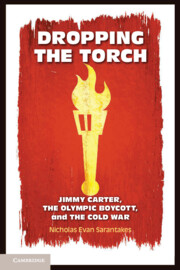Book contents
- Frontmatter
- Contents
- Acknowledgments
- Abbreviations
- Introduction Miracle on Ice
- Chapter 1 Lord Killanin and the Politics of the Olympics
- Chapter 2 Los Angeles versus Moscow
- Chapter 3 Jimmy Carter and U.S.-Soviet Relations
- Chapter 4 The Soviet Invasion of Afghanistan
- Chapter 5 The American Response
- Chapter 6 Easy Victories
- Chapter 7 Painful Losses
- Chapter 8 The White House Games
- Chapter 9 Coca-Cola, NBC, and the Defeat of the Iron Lady
- Chapter 10 The Vote in Colorado
- Chapter 11 Civil Wars
- Chapter 12 Carter versus Killanin
- Chapter 13 Moscow: The Olympics Are the Olympics
- Chapter 14 Los Angeles
- Chapter 15 Conclusion
- Epilogue
- Notes
- Bibliography
- Index
Chapter 8 - The White House Games
Published online by Cambridge University Press: 05 September 2012
- Frontmatter
- Contents
- Acknowledgments
- Abbreviations
- Introduction Miracle on Ice
- Chapter 1 Lord Killanin and the Politics of the Olympics
- Chapter 2 Los Angeles versus Moscow
- Chapter 3 Jimmy Carter and U.S.-Soviet Relations
- Chapter 4 The Soviet Invasion of Afghanistan
- Chapter 5 The American Response
- Chapter 6 Easy Victories
- Chapter 7 Painful Losses
- Chapter 8 The White House Games
- Chapter 9 Coca-Cola, NBC, and the Defeat of the Iron Lady
- Chapter 10 The Vote in Colorado
- Chapter 11 Civil Wars
- Chapter 12 Carter versus Killanin
- Chapter 13 Moscow: The Olympics Are the Olympics
- Chapter 14 Los Angeles
- Chapter 15 Conclusion
- Epilogue
- Notes
- Bibliography
- Index
Summary
In mid-February, Cutler’s assessment looked to be accurate. The Carter White House had suffered several defeats, but none of them were irreversible. Over the course of the next six weeks, the boycott effort would stall as the public mood started to shift. During this time, Cutler led the administration into a strategic cul-de-sac, exposing some of the worst elements of Carter’s leadership methods.
Much of the fading public support, though, had to do with the Winter Olympics taking place in Lake Placid. As figure skater Scott Hamilton carried the U.S. flag and led his teammates clad in their official team uniforms of brown sheepskin coats and cowboy hats into the brisk air of the opening ceremonies, a shift was taking place in public opinion. Sports columnist Ken Denlinger of The Washington Post argued that this change had already taken place. The boycott had been “a miscalculation of American passion for Olympic sport.” Denlinger explained, “Americans are wildly apathetic about the Olympic sports, until a month or so before they take place.”
Carter, however, refused to reconsider his position. At the annual meeting of the American Legion, he said the Soviet invasion of Afghanistan had “altered the careful balance of forces in a vital and a volatile area of the world.” He characterized the response of his administration as equitable but strong, and that included the boycott of the Moscow Olympics. “That deadline is tomorrow, and it will not be changed.” The Washington Post reporter covering the story noted this statement drew “strong applause” from an otherwise silent crowd. To add strength to this message, Carter, relying on Cutler’s advice, ordered the U.S. Army to cut all ties to the U.S. Olympic Committee that was in support of the trip to Moscow.
- Type
- Chapter
- Information
- Dropping the TorchJimmy Carter, the Olympic Boycott, and the Cold War, pp. 131 - 165Publisher: Cambridge University PressPrint publication year: 2010

